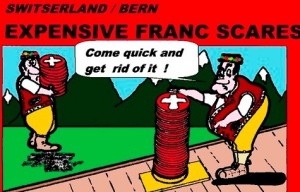Martin Wolfe writes: These are exciting times in European central banking. Last Thursday the Swiss National Bank suddenly terminated its successful peg to the euro. This week the European Central Bank is expected to announce its programme of quantitative easing. The SNB has embraced the risk of deflation from which the ECB wishes to escape.
The SNB’s decision was motivated, at least in part, by aversion to being caught up in the ECB’s QE programme. For Mario Draghi, the ECB president, the SNB’s decision is even helpful, since it weakens the euro. For many in northern Europe, however, the Swiss decision will be painful. It will remind them that they no longer enjoy the pleasures (and pains) of a strong currency. The Swiss can readily stop shadowing the euro; the Germans have been imprisoned in it.
The surprise decision created turmoil. Why end a policy that had delivered such enviable stability? The obvious answer is that the SNB feared huge inflation if it remained pegged to the euro, particularly after QE began.
The Swiss could have curbed inflationary dangers without abandoning the peg, for instance by increasing reserve requirements on banks. A sovereign wealth fund could have been set up to manage huge holdings of foreign assets.
Even if a peg to the euro was no longer thought to be desirable, it could have been given up without going cold turkey. Alternatively, it could have allowed the franc to move within a predetermined range, denying speculators a one-way bet on the value of the currency.
More interesting would have been a decision to go further in the direction of negative interest rates than the minus 0.75 per cent now imposed.
To make such a move stick, the authorities would have had to place limits on withdrawals from bank accounts or move entirely to electronic money, to prevent people from protecting their purchasing power by moving into cash. Needless to say, such radical ideas would horrify the prudent burghers of Switzerland.
QE is going to horrify the burghers of Germany, too. But it must now happen since it is the only way still available for the ECB to meet its definition of price stability.
The eurozone is in a slump, afflicted by the “chronic demand deficiency syndrome” that is the world economy’s biggest current weakness.
The question about the forthcoming QE programme is not whether it is needed but whether it will work. The political problem is more serious. It seems QE will be implemented in the teeth of opposition — not just from German members of the ECB governing council, who are entitled to their objections, but also from the German political establishment.
The difficulty is not that, to avoid the bogey of debt mutualisation, purchased bonds will end up on the balance sheets of national central banks. That fudge might even be an advantage to the more indebted countries.
The difficulty is rather that German opposition may fatally undermine the credibility of Mr Draghi’s insistence that the ECB will keep inflation on target.
It is all up to the ECB. It may well fail, not because it is too independent but because it is not independent enough. Similarly, the eurozone may fail, not because of irresponsible profligacy but rather because of pathological frugality. In the end, the ECB must try to do its job. If Germany cannot stand that, it may need to consider its own Swiss exit.

